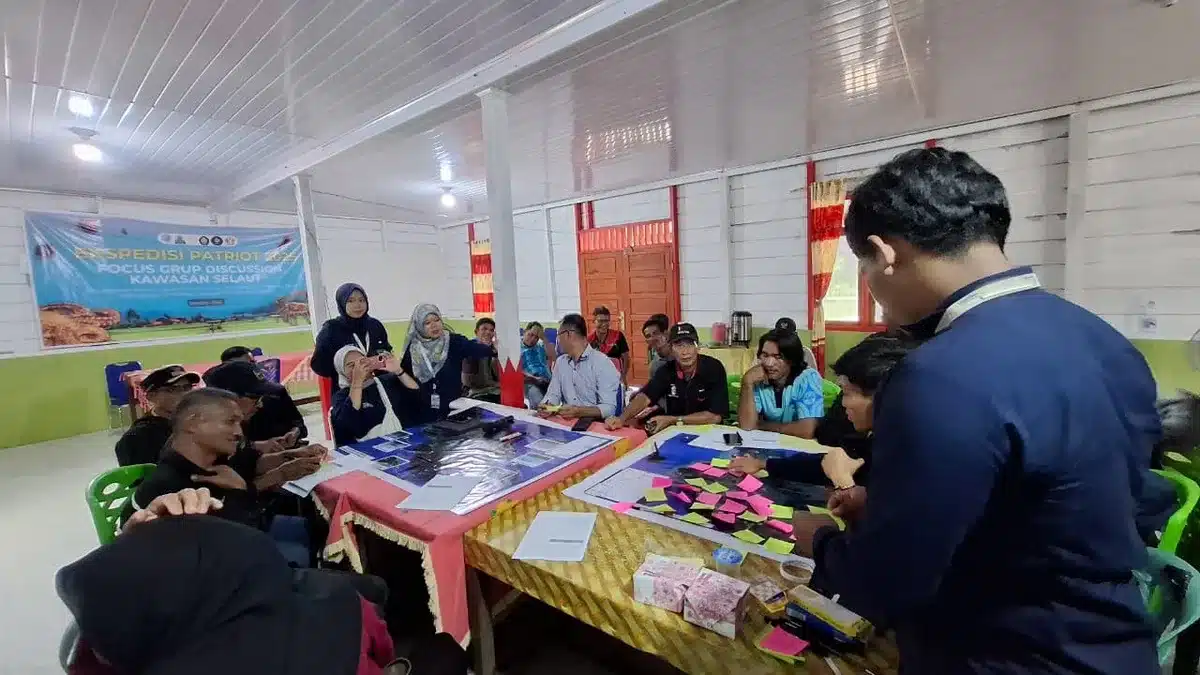UNDIP, Simeulue, Aceh (October 24, 2025) – The voices of residents echoed through the meeting hall of Jaya Baru Village, Salang District. In the middle of the room lay a large map covered with colorful sticky notes — green for potential, red for problems. Across the room, villagers, fishers, and local leaders shared a common topic: the future of their coastline.
This gathering was no ordinary government socialization session. It was a Focus Group Discussion (FGD) on Ecology and Infrastructure, facilitated by the Selaut Patriot Team from Universitas Diponegoro (UNDIP) as part of the 2025 Patriot Expedition Program initiated by the Ministry of Transmigration of the Republic of Indonesia (Kemtrans RI).
From Campus to the Field: Weaving Together Data and Community Voices
The activities in Salang and Alafan were more than just research. For the UNDIP Selaut Patriot Team, the FGD served as a two-way learning forum — where scientific data meets local experience, and policy is tested against real-world conditions.
“This map-based approach helps communities rediscover the relationship between ecological conditions and infrastructure availability. From there, we can design a more sustainable development direction,” said Dr.-Ing. Asnawi Manaf, S.T., Head of the UNDIP Selaut Patriot Team.
Since 2016, the transmigration areas in Simeulue have been designated as new development zones. However, as residents revealed, many challenges remain unresolved — irrigation that depends solely on rainfall, damaged roads and bridges, and fishing ports that have yet to be rehabilitated.
Through participatory discussions, the UNDIP team sought to re-map these issues — not just on paper, but on maps marked directly by the hands of the local people themselves.
The result was a socio-ecological map of western Simeulue, illustrating the interconnections among natural resources, access to infrastructure, and development policy directions — a living spatial portrait built from the narratives of coastal communities.
From Campus to the Field: Weaving Data and Citizen Voices
The activities in Salang and Alafan villages are more than just research. For the UNDIP Selaut Patriot Team, the FGDs are a two-way learning space—where scientific data meets community experiences, and policies are tested against realities on the ground.
“This map-based approach helps communities re-identify the relationship between ecological conditions and infrastructure availability. From there, a sustainable development direction can be designed,” said Dr.-Ing. Asnawi Manaf, S.T., Head of the UNDIP Sea Patriot Team.
Since 2016, the transmigration area in Simeulue has been planned as a new development area. However, as residents have revealed, many challenges remain unaddressed: from irrigation dependent on rain, damaged road and bridge access, to unrepaired fishing ports.
Through lively discussions and participatory methods, the UNDIP Team is attempting to remap these issues—not just on paper, but on maps colored directly by the community itself.
The result is a socio-ecological map of western Simeulue, depicting the interrelationships between natural resources, infrastructure access, and development policy directions — a vivid spatial portrait of the narratives of coastal communities.

Academic Collaboration: One Goal, Three Perspectives
This FGD was part of a collaboration among three leading Indonesian universities — Universitas Diponegoro (UNDIP), Institut Pertanian Bogor (IPB), and Universitas Indonesia (UI) — all of which participated in the Patriot Expedition Program of Kemtrans RI. Each university brought its own scientific focus:
- UNDIP emphasized ecology and infrastructure,
- IPB focused on economic resilience and food resources, and
- UI explored social institutions and governance within transmigrant communities.
The presence of these three institutions reinforced the principle of collaboration among academia, government, and communities in guiding development in Simeulue’s transmigration regions.
Affirming the University’s Raison d’Être in the Context of the SDGs
For UNDIP, the Patriot Expedition is more than a community service or research project. It represents the raison d’être of the university — an institution of knowledge committed to producing evidence-based policy and contributing directly to the achievement of the Sustainable Development Goals (SDGs).
“Through this map-based FGD instrument, universities can develop innovative, evidence-based problem-solving approaches, implemented through participatory, bottom-up processes,” said Dr.-Ing. Asnawi Manaf.
Field findings from the UNDIP team identified key focus areas:
- agricultural and fisheries potential (SDG 2 – Zero Hunger),
- the need for improvement in basic infrastructure (SDG 9 – Industry, Innovation, and Infrastructure), and
- strengthening coastal community social capacity (SDG 14 – Life Below Water and SDG 16 – Peace, Justice, and Strong Institutions).
These findings form the basis of strategic recommendations for a more inclusive and sustainable evaluation of transmigration areas.
Through this research, UNDIP reaffirms its role as a bridge between policy and reality — using data as a foundation for dialogue and maps as tools for participation — in the pursuit of development aligned with the global SDG agenda. (Public Communication/ UNDIP/ Selaut Patriot Team)










